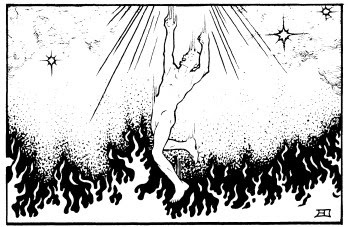Random Roll: DDG, p. 11

In a change of pace, I thought it might be interesting to take a look at a section from AD&D's Deities & Deimgods. On page 11 of that book, there's a section entitled "Divine Ascension," which I recall attracted a lot of attention among players I knew in my youth.
As study of the various mythologies will show, it is remotely possible for mortals to ascend into the ranks of the divine. However, there are certain requirements that must be fulfilled before such a thing could happen.
While I suppose it's possible that the players interested in seeing their characters ascend to godhood did so in imitation of Greco-Roman style apotheosis, I suspect the vast majority of them did so for far less historically-grounded reasons.
First, the character in question must have advanced to an experience level that is significantly above and beyond the average level of adventure-type characters in the general campaign. (This includes all such non-player types as military leaders, royal magic-users, etc.) For example, if the average level of characters in a campaign, both player and non-player, is around 5th level, then a candidate for ascension should be something like 9th or 10th level. If the average level is something like 15th level, then a character would have to be in the realm of 25th–30th level!
Given the overall premise – divine ascension – this seems reasonable. The fact that it specifies level ranges is surprisingly practical. That those levels are scaled to the average level of the campaign is fascinating.
Second, his or her ability scores must have been raised through some world-shaking magic to be on par with the lesser demigods. (Should such an act be lightly considered, remember that a wish spell is the most powerful magic that mankind can control, and such an average increase in abilities would literally take the power of dozens of wishes! Each use of that spell weakens the caster and ages him 3 years into the bargain, so they are not easy to come by.)
A quick perusal of the demigods described in the DDG suggests that even the "lesser" ones have multiple – if not all – ability scores above 18, usually in the 20–22 range Given that, this second requirement is particularly onerous and, in any reasonably run AD&D campaign, probably completely out of reach of most player characters.
Third, the personage must have a body of sincere worshipers, people convinced of his or her divinity die to their witnessing of and/or belief in the mighty deeds and miracles which he or she has performed (and continues to perform). These must be genuine worshipers, honest in their adoration or propitiation of the person.
Again, this seems reasonable, though, in a world in which magic is, if not commonplace, a well-established and widely known thing, what constitutes a "miracle?" "Mighty deeds" are probably easier to quantify, though these too are probably defined in a relative fashion.
Fourth, the person in question must be and have been a faithful and true follower of his or her alignment and patron deity. It is certain that any deviation will have been noted by the divine powers.
The most notable thing about this last requirement is the implication that being "a faithful and true follower" of one's alignment is not the same thing as being such of one's patron deity. The relationship between alignment, the Outer Planes, and the gods in AD&D is a vast topic with no clear answers, so I won't delve into it here. However, I do want to draw attention to it, since I think there are some rich possibilities to mine.
If all of the above conditions have been met, and the character has fulfilled a sufficient number of divine quests, then the character's deity may choose to invest the person with a certain amount of divine power, and bring the character into the ranks of the god's celestial (or infernal) servants.
"Divine quests?" Are these the same as the mighty deeds and miracles mentioned earlier or something else entirely? I assume the latter, though the text is not clear.
This process of ascension usually involves a great glowing beam of light and celestial fanfare, or (in the case of transmigrating to the lower planes), a blotting of the sun, thunder and lightning, and the disappearance of the character in a great smoky explosion.
Perhaps it's just me, but I find the description of ascension rather tacky.
Characters thus taken into the realms of the gods will serve their patron as minor functionaries and messengers. After several centuries of superior service and gradual advancement, exceptional servants may be awarded the status of demigod, which includes have an earthly priesthood and the ability to grant spells (up to 5th level) to the demigod's clerics.
The bit about demigods being able to grant spells of up to 5th level is an interesting expansion/clarification of a section in the Dungeon Masters Guide that talks about the acquisition of clerical spells.
Naturally, ascension to divinity effectively removes the character from the general campaign, as the person will become a non-player member of the DM's pantheon.
I think this final sentence pretty well sums up the general tenor of this section: yes, it's possible for a character to ascend to godhood, but it's really hard to do and, in the end, your character becomes an NPC who might, in a few centuries be recognized by mortals for his divinity. In short: why bother?
James Maliszewski's Blog
- James Maliszewski's profile
- 3 followers



